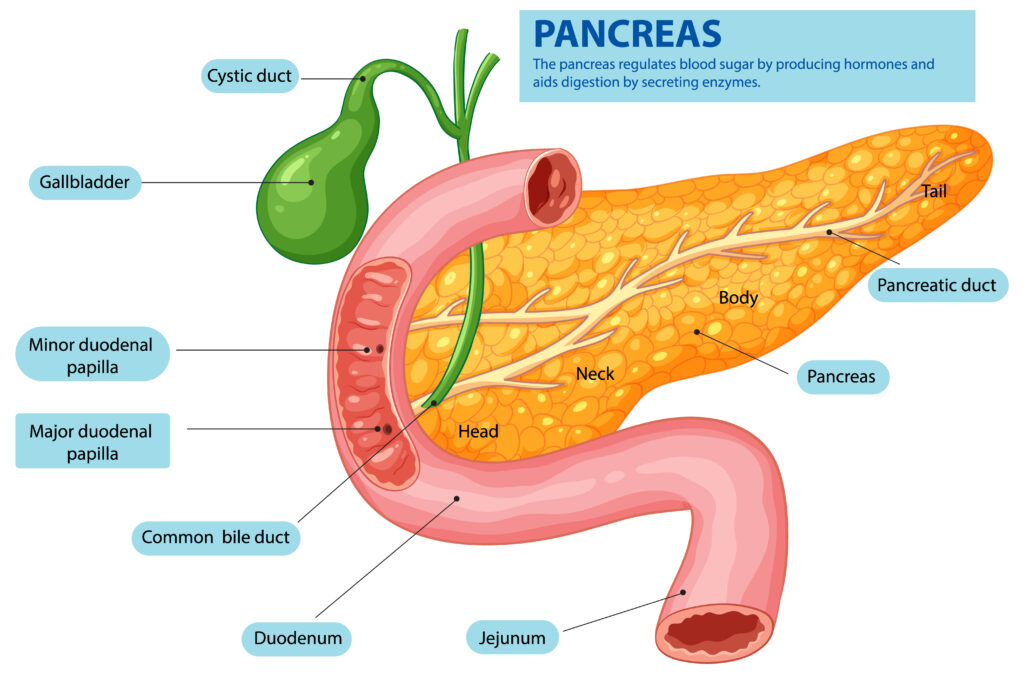Experiencing digestive issues? Learn the key signs of low pancreatic enzymes, from digestive problems to unexpected weight loss. Expert guide to identifying and managing EPI symptoms.

Introduction:
Have you been feeling “off” after meals lately? You’re not alone! As a digestive health specialist, I’ve seen countless patients struggling with unexplained digestive issues, and surprisingly often, low pancreatic enzymes are the culprit. In fact, studies show that up to 94% of people with certain digestive conditions have insufficient pancreatic enzymes – yet many don’t even know it! Let’s explore the telltale signs of low pancreatic enzymes that you should watch for, and more importantly, what you can do about them.
Understanding How Pancreatic Enzymes Work
Our pancreas, often underestimated, functions as an efficient chemical powerhouse! These enzymes are vital for the breakdown of fats, proteins, and carbs, allowing the body to absorb essential nutrients. Therefore, any insufficiency in pancreatic enzymes hinders the digestive process, much like attempting to clean dishes without soap – a daunting task.
Common Digestive Signs You Shouldn’t Ignore
Let’s talk about what your body might be telling you! The most obvious signs of low pancreatic enzymes often show up in your digestive system first. If you notice oily stools that float or are difficult to flush (doctors call this steatorrhea), that’s your body waving a big red flag! You might also experience frequent gas, bloating (especially after fatty meals), and stomach pain. I always tell my patients to pay attention to when these symptoms occur – do they happen right after eating? That’s a crucial clue! Many people also report loud stomach gurgling or feeling uncomfortably full after eating just a small amount.
Weight and Nutrition Red Flags
Here’s something that may come as a surprise to many – it’s possible to consume an adequate amount of food and still experience weight loss! Insufficient pancreatic enzymes can hinder your body’s ability to extract nutrients from the food you consume. This can be compared to having a tank full of gas but a blocked fuel line. Be vigilant for unplanned weight loss, even if your appetite and eating patterns remain consistent. Moreover, you may experience increased fatigue, brittle nails, or dry skin. The consequences of low pancreatic enzymes extend beyond digestion to impact your overall well-being.
Beyond the Bathroom: Other Important Signs
Did you know that signs of low pancreatic enzymes can show up in unexpected ways? Some people develop joint pain or notice they bruise more easily. Others report brain fog or mood changes – after all, when your body isn’t absorbing nutrients properly, it affects everything! You might even notice changes in how your body handles blood sugar. Keep an eye out for unusual fatigue, especially after meals, or feeling shaky between meals. These subtle signs are easy to miss but important to notice!
Risk Factors and Related Conditions
Let’s talk about who needs to be extra vigilant about signs of low pancreatic enzymes. If you have chronic pancreatitis, cystic fibrosis, or celiac disease, you’re more likely to develop this condition. Even having had gallbladder surgery or a history of alcohol use can increase your risk. But here’s the thing – sometimes there’s no obvious cause! That’s why it’s so important to pay attention to your body’s signals, regardless of your medical history.
Getting Diagnosed: What to Expect
Worried you might have signs of low pancreatic enzymes? Don’t panic! Getting diagnosed is straightforward, though it might take a few different tests. Your doctor might start with a simple stool test to check enzyme levels, or they might recommend blood tests or imaging studies. The key is to be honest about all your symptoms – even the embarrassing ones! Keep a symptom diary for a few weeks before your appointment. Trust me, your doctor will appreciate the detailed information!
Taking Control: Treatment Options and Solutions
Here’s the good news – there are effective treatments for low pancreatic enzymes! Enzyme replacement therapy can make a huge difference, and it’s as simple as taking a capsule with meals. But it’s not just about medication. Small changes in your diet can have a big impact too. I recommend eating smaller, more frequent meals and paying attention to fat intake. Working with a nutritionist can help you develop a personalized plan that works for you. Remember, managing signs of low pancreatic enzymes is a journey, and you’ve got plenty of support options available!
Conclusion:
Living with signs of low pancreatic enzymes doesn’t have to be overwhelming! By understanding what to look for and taking action early, you can take control of your digestive health. Remember, you’re not alone in this journey – thousands of people manage this condition successfully every day. If you’ve noticed any of these signs, don’t wait to reach out to your healthcare provider. Your body will thank you for taking that first step toward better health!





